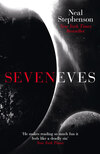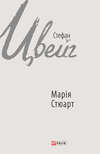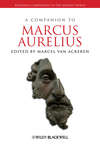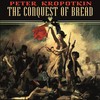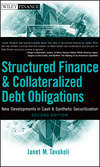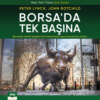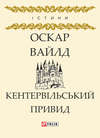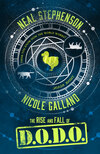Kitabı oku: «Seveneves», sayfa 13
DAY 287
“Got any tater-related humorous items for me?” Ivy asked. “’Cause oh, man, could I ever use some comic relief.”
Dinah wasn’t sure how she felt about Ivy looking to her doomed family as a source of casual amusement, but as they were only some 433 days away from the end of the world, she didn’t really think there was much point in getting shirty about it.
The situation did breed a kind of coarseness toward those stuck on the ground. It was humanly impossible to extend to seven billion people the full sympathy that each of them deserved. Dinah had begun to hear instances of dark humor over the radio, and had noticed herself being at least a little bit amused by it.
Nor was that dark humor restricted to Arkers, as Dinah’s family demonstrated. They were intelligent people—you had to be, to do what they did—but they went in for a certain brand of mining-camp humor, heavy on the practical jokes and novelty items that you’d never see in a boardroom or a faculty lounge. And once they’d latched on to something that they thought was funny, they’d never let go of it. A half-serious Morse code message about planting a flat of potatoes, transmitted by Rufus shortly after the Crater Lake announcement, had sprouted into a whole subgenre of running jokes about the preparations that the MacQuarie clan was making for the Hard Rain. In her occasional care packages from the ground, Dinah was now accustomed to finding fingerling potatoes, still with real dirt on them, or plastic parts for Mr. and Mrs. Potatohead toys. She even had a rusty old Idaho license plate duct-taped to the wall of her shop now, emblazoned with the slogan FAMOUS POTATOES, courtesy of Rufus, who’d gotten it from a mining industry pal in that state’s silver-rich panhandle.
“Is that a no?” Ivy asked.
“Oh, I have potato shit all over the place now,” Dinah said. “I’m just no longer sure that they’re joking.”
“What do you mean?”
“At first I thought it was their way of saying, ‘We know we are screwed, no point in being babies about it, let’s laugh it up until the end.’ But now I’m starting to ask myself what it is they’re doing. I mean, they’re up there in the Brooks Range with all of this equipment. They could drive down to Fairbanks any time they feel like it, and from there go anywhere in the world. Check out the pyramids. See the Mona Lisa. Visit old friends and family. Instead they’re up in the most godforsaken place I’ve ever seen, doing what?”
“Prepping?” Ivy said.
“That’s the only thing I can think,” Dinah said. “Prepping for a five to ten-thousand-year stay.”
“They’re not the only ones,” Ivy said.
It took Dinah a few moments to catch her friend’s meaning. Then it was clear, just from the look on Ivy’s face. “Are you shitting me? Cal?”
Ivy made just a suggestion of a nod with her eyes. “Mixed in with the stuff you’d expect from a fiancé—which is none of your business—he asks me questions about things like the comparative merits of lithium versus sodium hydroxide scrubbers. He requests copies of Luisa’s PDFs about the sociology of persons confined in small places for long periods.”
“He can’t think you’re not going to notice that.”
“Sure. I’m going to read between the lines.”
“What do you suppose he’s thinking?”
“Well,” Ivy said, “he does have sole authority over a huge submarine designed to ride out global thermonuclear warfare. And when the United States ceases to exist, I guess there’ll be no one above him, chain-of-command-wise. What’s a commander to do?”
“But how would it work?”
“I think a lot depends,” Ivy said, “on whether the oceans boil dry. If I were him, I’d make for the Marianas Trench and keep my fingers crossed.”
“I would think it would be even harder than staying alive in space.”
Ivy looked at her friend with dry amusement.
“What?!” Dinah said.
“Staying alive in space is going to be a piece of cake, remember?”
“Oh yeah, sorry. I forgot …” To put on my makeup. “It would present some fascinating challenges,” she corrected herself, switching to her best NASA PR voice.
“I think it’s like what we are doing,” Ivy said. “You have to break it down into a lot of little things and solve them one at a time, or you get overwhelmed.”
“Is that what we’re doing?”
“Yeah.” Ivy rolled her eyes.
“What’s on your mind? Other than the need for comic relief?”
“You. How you’re doing. Your health,” Ivy said.
“Oh my god, is this an actual meeting? Are we on official business here?”
Ivy ignored her. “You haven’t been logging much T2 time.”
T2—the second torus, which Rhys had been responsible for building—had started to spin on Day 140. Its simulated gravity was one-eighth of Earth normal, only a little greater than that on the first torus. It was bigger and spun more slowly, which Rhys hoped would make it a little more comfortable. Simply being in it helped counteract some of the negative effects of living in space for extended periods of time. People who lived without gravity suffered a gradual loss of bone density and muscle mass. Eyes went out of shape and vision deteriorated. Space station crews tried to fight this by using exercise machines that placed stress on the bones, but these were stopgap measures meant for people who were only going to be in space for a few months. Dinah, Ivy, and the other ten members of the original Izzy crew had now been up here for close to a year. During the first few months after Zero, no one had paid much attention to long-term health issues. Everyone was going to die. Scouts were showing up dead on arrival. It had been all emergency, all the time. But during the months of hamster tube building and structural consolidation, the life scientists had been quietly having their say. This wasn’t the first time Dinah had been nudged in recent weeks about her failure to spend more time in the simulated gravity field of T2.
“It’s just hard to go back and forth between gravity and no gravity,” Dinah said. “It makes me barf. And none of my stuff is in T2.” She was referring, as Ivy would know, to the shop where she worked on her robots.
“But isn’t that mostly remote work? Writing code?”
“Yeah, I just like to be where I can see them out the window.”
“Don’t they have little cameras on them?”
Dinah had no answer for that.
“Whatever you’re doing here,” Ivy continued, “you could do from a cabin in T2, where the gravity would build your bones.”
“It’s also Rhys,” Dinah admitted. “Things have been a little weird with him and I just don’t want to—”
“Rhys never even goes to T2,” Ivy said. “He’s been hanging out with the inflatable structures team.”
“Okay,” Dinah said. “Give me a place to work on T2 and—”
“There’s another thing,” Ivy said, and let out The Sigh. The Sigh was what Ivy did when the powers that be were making her do something ridiculous. It would never show up in the transcript of a meeting, but it changed everything.
“I don’t even want to guess,” Dinah said.
“We have all become characters in a reality TV show,” Ivy said. “You might not be aware of it.”
“Nah, I haven’t been watching much TV.”
“Well, it’s all people have to do anymore, down on the ground. The economy is shutting down, and people are just eating beans and entertaining themselves with screen time.”
“Okay.”
“I’ve been asked to pay more attention to message shaping.”
“Message shaping? What’s that?”
Ivy let out The Sigh.
“Okay, never mind,” Dinah said.
“People want to know what became of their Uppity Little Shitkicker.”
“Really?”
“Yeah,” Ivy said. “People like their ULS. They remember the thing you did with Tekla. Tekla porn is a big thing now too, by the way.”
“I don’t want to hear about it.”
“Anyway, people are asking where is plucky Robot Girl and her mechanical menagerie.”
“That explains some weird emails I have gotten.”
“From random strangers?”
“No, from my own family! I don’t read the ones from random strangers. How about you? What’s your role on the reality TV show, Ivy?”
Ivy stared at her coolly. “I’m the uptight bitch who can’t handle it.”
“Oh.”
“To American viewers, I’m not fully American. To Chinese viewers, I’m a banana.”
“I’m sorry, Ivy.”
“That’s the bad news.”
“Okay, and what is the good news?”
“All the people saying mean things about me on the Internet are gonna be dead in four hundred and thirty-three days,” she said, deadpan.
Okay. It was an example of that dark humor thing.
“After that, none of it matters—except my ability to be of service to Our Heritage.”
“Okay, baby, how can I help you?” Dinah asked. “We could take a selfie, you and me, and I could post it on the Uppity Little Shitkicker blog.”
“You and I are going to go for a ride on the first operational bolo,” Ivy said, “and you are going to be reminded of what one gee feels like.”
Casting of Lots
DURING THE FIRST FEW DAYS AFTER THE MOON HAD BLOWN UP, Doob had spent hours gazing up at Potatohead, Mr. Spinny, Acorn, Peach Pit, Scoop, Big Boy, and Kidney Bean. They were visible in the daytime, just as the moon had formerly been, and even on the rare day when it was cloudy in Pasadena, or he was stuck indoors, he could pull up a window on the screen of his computer and watch them on a live video feed.
After he had figured out that they were going to kill everyone on Earth, he had become a lot less interested in staring at them. He had, in fact, sometimes gone for weeks without looking up at the gradually spreading cloud of debris. Sometimes while walking across a dark parking lot or driving down the highway he would catch sight of the moon-chunks in the sky and deliberately turn his gaze away from them. They filled him with horror and even a kind of shame over the fact that he had once found the whole thing such a fascinating science treat. He did not want to be reminded of it. Instead he tracked the slow disintegration of the moon-pieces through spreadsheets and plots shared with him by his graduate students and his colleagues. He did everything he could to reduce the whole state of affairs to two numbers. One of these was the Bolide Fragmentation Rate, or BFR, which was a measure of how frequently big rocks were being made into small rocks. The other was, quite simply, how many days remained before the White Sky.
On Day 7, minutes after they had met, he and Amelia had watched Kidney Bean fracture into two big chunks, later dubbed KB1 and KB2 (though attempts had been made at the time to give them cutesy names of their own). Three weeks later Scoop had collided with Big Boy and broken into three pieces, SC1, SC2, and SC3. Big Boy itself was now BB1, still fairly recognizable, plus a whole family tree of bits that had shrapneled off its smaller piece, BB2. These were given code numbers such as BB2-1-3, meaning the third-biggest fragment of the largest fragment of the second-biggest piece of Big Boy. Beyond about that level it became difficult, and somewhat pointless, to keep track of them all. Mr. Spinny had caused all sorts of havoc before finally breaking in half; its wayward children MS1 and MS2 had gone winging off in opposite directions and ended up in big eccentric orbits around the rubble cloud’s shared center of mass, occasionally looping in from a great distance and slamming into one of the slower-moving pieces. MS2 had broken Acorn into three pieces just three days before Doob’s memorable Oval Office chat with the president. While he’d been flying back to L.A., a hunk of it the size of an oil tanker had slammed into the Indian Ocean and kicked up a tsunami that had killed forty thousand people on the west coast of India.
After he got home from his trip to D.C., he and Amelia checked into a suite at the Langham, a palatial hotel in Pasadena, so that they could spend a few days together before he went out on a round-the-world journey. All through their romantic dinner on the terrace he made a concerted effort not to look at the remains of the moon. Later they went back to their suite and made love. After twenty minutes’ postcoital cuddling, Amelia rolled over on her side and went to sleep, inviting Doob to spoon with her, but Doob, unable to relax, pulled his tablet onto his lap, put on his reading glasses, and started killing time on the Internet. The French doors to the balcony were open, and at some point the breeze coming in through them obliged Amelia to snuggle deeper under the blankets. Doob got up and walked over to close the doors, and was confronted by the sight of the moon-cloud, directly in front of him, hanging over the lights of L.A., and now something like four times the diameter of the original moon. It was arresting, partly because it had been so long since he had looked squarely at it, and so he stood there for a while observing. Peach Pit was still largely in one piece, but other than that the original Seven Sisters were no longer discernible.
Out of curiosity he consulted an app that told him when Izzy would be passing over, and saw that it was going to happen in about ten minutes. So he stood there and waited for it. As he waited, his attention turned again and again to the pieces of the moon. What was their future? He knew that they would shatter into an uncountable number of fragments and become the White Sky and then the Hard Rain. But what was the final distribution of sizes going to be, how many big ones and how many small? They had some models based on the simplifying assumption that all moon rock was basically the same, but clearly that wasn’t true.
They had done some analysis on the original chunks, trying to figure out why Peach Pit was so resistant to fragmentation, and determined that it was simply the inner core of the old moon. Which was confirmed anyway by an analysis of its mass: Peach Pit was much denser than the other bits, suggesting that it consisted mostly of iron as opposed to rock. The moon had had an iron core, but, relative to overall size, this was much smaller than the Earth’s; most of the moon was cold, dead stone.
And yet the core was there, and was thought to consist of a ball of solid iron surrounded by a somewhat hotter jacket of molten iron mixed with various other elements. All of this had been stripped bare and exposed to space by the Agent. For the first few hours, Peach Pit had literally glowed with radiant heat. Or so they guessed, since the dust kicked up by the cataclysm had cloaked it for a while. Some of the core’s outer jacket of molten metal must have been torn away, dispersed into the rubble cloud as gobbets and slugs and droplets of melt that soon cooled and hardened. As much was proved by metal-rich bolides that had since plowed into the Earth and been dug up and analyzed. By the time the dust had literally settled to the point where Peach Pit and its siblings were clearly observable, an outer crust had formed over it, consisting of melt that had cooled swiftly as it radiated its heat into space. The cooling had continued ever since. Now, the better part of a year later, Peach Pit, or PP1 as it was now designated, was still warmer than the other parts of the moon. It had shown greater resistance to fragmentation. Other rocks bounced off it, or dashed themselves to pieces on its gleaming surface. A few significant chunks—PP2, PP3, and so on—had been ripped off in the early days when it had still been soft, but now it was clad in a mile-thick armor of solidified iron that was proof against just about any calamity short of a second Agent.
Doob became so absorbed in such thoughts that he almost missed the transit of Izzy across the sky. It angled directly over the rubble cloud, seeming to weave among the giant tumbling boulders, though this was of course an illusion. It had long been the brightest man-made object in the sky, and it was brighter now that so many pieces had been added onto it. The effort had been impressive. Stirring, even. But seeing it against the scale of the disaster behind it forced him to ask himself what was the point. What was the longer-term plan for the Cloud Ark? The swarm concept was a nice architecture, much more survivable than One Big Ship, but where was it going to go?
No one seemed to be talking about that. He understood why. Survival was the first imperative. Long-term strategy came next.
The amount of iron in PP1 was for all practical purposes infinite. It would take humans many thousands of years to find uses for that much metal.
But it was way up high. Hard to reach.
And yet they had to reach it.
And it was closer, easier to reach, than the Arjuna asteroids that Sean Probst was so excited about.
Feeling an idea take shape in his head, like an iron core congealing deep in a moon, he put it on hold and forced himself to turn his attention to more immediate questions. A few days ago in the Oval Office he had formed a resolve to get his ass into space and begin making things happen up there. Which was fine. But he had three months left on terra firma. He couldn’t neglect his responsibilities here. Some of which—the most important—were to his kids, to Amelia, and to their frozen embryo. But on top of that he had been given other jobs, and if he screwed them up badly enough, e.g., because he was standing on hotel balconies in the middle of the night thinking about how much iron was in PP1, then they might not send him up to the Cloud Ark at all. He hadn’t wanted to go, but once he had assented to the idea, he had begun wanting it more than anything, and he now feared that they would take it away from him. And if they sensed that fear, they could use it to control him. Better to overperform, to exceed expectations, to act like it was nothing at all.
SEVENTY-TWO HOURS LATER HE WAS LOOKING OUT THE WINDOW OF a U.S. Navy helicopter banking through a misty Himalayan valley as it lined up its final approach to a runway in Bhutan. Or perhaps the runway in Bhutan was the more correct phrasing.
There were about 750,000 people in this country, which meant that they were entitled to supply two candidates for the Cloud Ark. The arithmetic was a little fuzzy; if the same ratio were applied consistently all over the world, something like twenty thousand candidates would be gathered in. If an arklet could accommodate five people, then four thousand arklets would be needed in the swarm. Each arklet required a heavy-lift rocket to get it into orbit, and some assembly and prep work once it had reached Izzy.
Could it be done? If the entire industrial capacity of the world were thrown into the production of rockets, arklets, space suits, and the other goods needed? Perhaps. But probably not. Doob was privy to some recent estimates that put the numbers at closer to one-quarter of that figure.
And anyway, could the arklets really support five humans each? Without a doubt they were large enough for five people to bang around in, but it was not at all clear that each could be self-sufficient in food production. Building a sustainable ecosystem in a tube the size of a railway tank car was no small task. Biosphere 2, a well-known experiment in the Arizona desert, had attempted to support eight people on an ecosystem the size of a couple of football fields, and been unable to make it work long term. But its mission had been clouded by political strife and odd quasi-spiritual factors. A more down-to-earth project run by the Soviets had determined that eight square meters of algae—an expanse of pond scum about the size of two ping-pong tables—was needed to keep a single human supplied with oxygen. In the space between the hard inner hull and the inflated outer hull of a single arklet there was more than enough room. But much more real estate would be needed if the arklet were also to produce food. And those calculations didn’t even begin to address the real complications of keeping thousands of people alive in space for many years. It wasn’t enough just not to asphyxiate and not to starve. People would need medicine, micronutrients, recreation, stimulation. Ecosystems would get out of whack and need to be repaired with pesticides, antibiotics, and other hard-to-make chemicals. The thrusters that kept the arklets out of trouble would need to be refueled, and not only that but they would need maintenance and repair. The idea of a completely decentralized Cloud Ark was a chimera; it was not sustainable without a mother ship, a central supply dump and repair depot. The only plausible candidate for that was Izzy. But Izzy wasn’t designed for anything like that purpose. They’d been trying to make it over by cramming it with vitamins, but that only delayed the moment when they’d run out of all the goods they didn’t know how to produce in space, and people would begin dying in quantity.
From the fact that he had gotten nowhere raising awkward questions about this, Doob inferred that the Arkitects knew about it, and were on it, and just didn’t want to talk about it because public doubt and controversy were not going to help. Doob’s job, clearly, was to act like everything was okay. Today, that meant scooping up two young people from the Himalayan kingdom of Bhutan.
Did the little performance he was about to put on really mean that twenty thousand people from all over the world were going to end up living happily in the Cloud Ark? He just had to shut down the little Rain Man in his head—“Doob, as in dubious”—and not even think about it.
They had taken off two hours ago from the George H. W. Bush, a supercarrier keeping station in the Bay of Bengal. Doob had viewed the ship through the eyes of a man who, in a few months, would be making a permanent move to its orbiting equivalent. She was a completely artificial island, thousands of people densely packed into a wad of pure technology. The professionalism of the crew and the efficiency with which she ran were amazing. Could something like that be duplicated in space, with people chosen by lot from all over the world, and trained in camps over the course of a single year?
He reckoned he would know more in about half an hour.
The navy chopper plunged into a fog-stuffed slot between mountains and knifed through steam and mist for a few minutes. The airport’s sole runway came into view, startlingly close to them. The chopper flared to a perfect landing a stone’s throw from the terminal building. Doob became aware that his jaw was clenched, and tried to relax it. He had made the mistake of googling this place and learned that it was bracketed by eighteen-thousand-foot mountain peaks, that only eight pilots in the world were certified to land here, and that even they didn’t attempt it unless the sun was shining on the runway. Obviously the kinds of guys who flew choppers for the navy operated according to different rules, but it had still been a white-knuckle approach as far as Doob was concerned, and it made him wonder how he was going to react to being hurled into space on top of a hastily constructed tube full of explosive chemicals.
He shifted in his seat and felt a thick manila envelope slide out of his lap and to the deck with a solid thunk that almost woke up Tavistock Prowse. Tav had been sitting across from him for the entire duration of the flight, and had been sleeping for the last half hour—prostrate from jet lag. He was a bulky man, not especially tall, but constructed like a wrestler. The bald spot on the back of his head, which had been faintly visible even when he’d been in college, had expanded mercilessly, leaving just a monklike fringe of close-cropped hair around the back of his bullet-shaped head. Perhaps to draw attention away from it, he wore glasses with massive black frames. At one point a serious weight lifter, he had softened and spread in the last decade, and even more so since Zero. It was strange in a way to see him unconscious, for he never seemed to stop moving.
Doob had a pretty good idea why. Tav was hoping he’d get picked. If he worked hard enough, popped up on enough news feeds, garnered enough followers on Twitter, maybe some important person would decide that the Cloud Ark needed a professional communicator—the first, or the last, journalist. To Doob it seemed like long odds. A lot of people with Ph.D.s and even Nobel Prizes were ahead of Tav in line. But you never knew. And he couldn’t fault the guy for trying.
He bent forward and retrieved the envelope from the deck. It was a centimeter thick. It was labeled PARO, BHUTAN in neat block letters. The flap had never been opened. He was supposed to have spent the last couple of hours reading its contents, familiarizing himself with the task to be performed. Instead of which he had been looking out the window at the steamy green plains and lazily braided rivers of Bangladesh.
Hoping to make the most of the two or three minutes it would take to get the chopper’s door open, he plucked it up off the floor, tore it open, and pulled out a sheaf of pages. This was enough to wake Tav up, but not enough to make him move. He gazed at Doob and watched him read.
“If it’s wearing red, yellow, or both, it’s a lama,” he said. “Bow to it.”
“Isn’t that a camel from South America?”
“With one L. A holy man. Put the palms of your hands together and make a little bow.”
“I don’t believe in—”
“It’s not gonna kill you, is it? If he’s got a big yellow scarf over his left shoulder, he’s the king. Bow lower in that case.”
“Thanks. Anything else?”
Sitting next to Doob was Mario, their photographer: a man in his thirties with a short, dark mustache, a New York accent, and no expectation whatsoever of being picked for the Cloud Ark. On the flight over he had divided his time between reading his own copy of the same dossier and playing a video game on his phone. He had been on many more of these than Doob or Tav. Getting into the spirit of things, he pocketed his phone and piped up: “People are going to hand you things. Some of them might be really crusty and old and funny smelling. Those things are probably really important. Really important.”
“Then why are they—”
“Because they believe you are going to take it all up into space and preserve it.”
“Oh.”
“So if anyone hands you anything, even if you have no idea what on God’s green Earth it might be, look impressed, bow, take it carefully, admire it, and then hand it off to the helper kid.”
“Helper kid?”
“People have been deputized to follow you around and help you carry all of the priceless national treasures that are going to be bestowed on you. They’ll look after the stuff and bring it all back here to the chopper so you can keep your hands free for making those little bows and shaking hands with the king or whatever. As soon as we get back to the aircraft carrier, we’ll throw it overboard.”
“Done this before, have you?”
“This is my seventy-third abduction run. Let’s go.” Mario stood up, carefully, letting his cameras and bags swing free, patting each one as it settled into place. Tav and Doob were undoing their seat belts and watching him for cues. Mario took two steps toward the door, which the pilot had just swung open. Cold damp air, scented with pine and coal smoke, was pouring in.
Doob almost rear-ended Mario as he stopped suddenly and turned around to look him in the eye. “One other thing.”
“Yes?” Doob said.
“What is about to happen is going to be incredibly fucking sad. Like maybe the saddest thing you have ever seen. Try to hold it together.”
Mario held Doob’s gaze until Doob nodded and said, “Thanks.” Then he turned around and bolted for the door so that he could get some good pictures of Dr. Harris emerging from the chopper.
Dr. Harris paused in the open hatchway. Spread out in front of him were at least two dozen people in red and yellow clothing, drawn up in readiness to extend greetings.
He put his palms together in front of his chest and bowed. In front of him, Mario’s shutter began to whirr. Behind him, faint digitized clicks spilled out of Tav’s phone as he live-tweeted it.
THE KING DROVE HIM UP THE MOUNTAIN IN HIS PERSONAL LAND Rover, Doob riding shotgun in the passenger seat on the left—for Bhutan, as it turned out, was a drive-on-the-left country. Mario sat in the back angling to get both of them in the photo, and Tav sat next to Mario muttering voice memos into his phone. The king apologized for today’s murky weather, which was blocking potentially spectacular views of high mountains all around.
“But I suppose that is a very small matter in the larger scheme of things,” he concluded.
They had stopped at an intersection in the town of Paro to let three boys kick a soccer ball across the road in front of them. Piled up on the road behind them was a small motorcade of lama-packed Toyotas.
“So much joy they take in this simple game,” the king mused. “They know, of course. All of them know about the disaster that is to come. When they are thinking of it, it makes them sad. But at other times, they are as you see them—oblivious.”
The boys got out of their way and the king eased forward into the intersection. The town had a surprisingly Alpine look to it, with deep brown weather-beaten structures of wood built on stone foundations.
“Until a few days ago,” the king went on, “they might have consoled themselves by imagining that they would be the ones chosen.”
“In the Casting of Lots,” Doob said.
“Yes.” The king shot him a keen look. “I was responsible for choosing, you know.” He glanced back at Tav. “That is off the record.”
